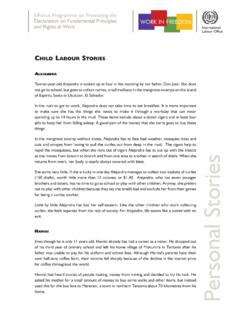Transcription of Charles Baudelaire, “The Painter of Modern Life” (1863 ...
1 Charles Baudelaire, The Painter of Modern life (1863). III. An Artist, Man Of The World, Man Of Crowds, And Child Today I want to talk to my readers about a singular man, whose originality is so powerful and clear-cut that it is self-sufficing, and does not bother to look for approval. None of his drawings is signed, if by signature we mean the few letters, which can be so easily forged, that compose a name, and that so many other artists grandly inscribe at the bottom of their most carefree sketches. But all his works are signed with his dazzling soul, and art-lovers who have seen and liked them will recognize them easily from the description I propose to give of them.
2 M. C. G. loves mixing with the crowds loves being incognito, and carries his originality to the point of modesty. M. Thackeray, who, as is well known, is very interested in all things to do with art, and who draws the illustrations for his own novels, one day spoke of M. G. in a London review, much to the irritation of the latter who regarded the matter as an outrage to his modesty. And again quite recently, when he heard that I was proposing to make an assessment of his mind and talent, he begged me, in a most peremptory manner, to suppress his name, and to discuss his works only as though they were the works of some anonymous person.
3 I will humbly obey this odd request. The reader and I will proceed as though M. G. did not exist, and we will discuss his drawings and his watercolors, for which he professes a patrician's disdain, in the same way as would a group of scholars faced with the task of assessing the importance of a number of precious historical documents which chance has brought to light, and the author of which must for ever remain unknown. And even to reassure my conscience completely, let my readers assume that all the things I have to say about the artist's nature, so strangely and mysteriously dazzling, have been more or less accurately suggested by the works in question; pure poetic hypothesis, conjecture, or imaginative reconstructions.
4 M. G. is an old man. Jean-Jacques began writing, so they say, at the age of forty-two. Perhaps it was at about that age that M. G., obsessed by the world of images that filled his mind, plucked up courage to cast ink and colors on to a sheet of white paper. To be honest, he drew like a barbarian, like a child, angrily chiding his clumsy fingers and his disobedient tool. I have seen a large number of these early scribblings, and I admit that most of the people who know what they are talking about, or who claim to, could, without shame, have failed to discern the latent genius -1- that dwelt in these obscure beginnings.
5 Today, M. G., who has discovered unaided all the little tricks of the trade, and who has taught himself, without help or advice, has become a powerful master in his own way; of his early artlessness he has retained only what was needed to add an unexpected spice to his abundant gift. When he happens upon one of these efforts of his early manner, he tears it up or burns it, with a most amusing show of shame and indignation. For ten whole years I wanted to make the acquaintance of M. G., who is by nature a great traveler and very cosmopolitan.
6 I knew that he had for a long time been working for an English illustrated paper and that in it had appeared engravings from his travel sketches (Spain, Turkey, the Crimea). Since then I have seen a considerable mass of these on-the-spot drawings from life , and I have thus been able to read' a detailed and daily account, infinitely preferable to any other, of the Crimean campaign. The same paper had also published (without signature, as before) a large quantity of compositions by this artist from the new ballets and operas. When at last I ran him to ground I saw at once that I was not dealing exactly with an artist but rather with a man of the world.
7 In this context, pray interpret the word artist' in a very narrow sense, and the expression man of the world' in a very broad one. By man of the world', I mean a man of the whole world, a man who understands the world and the mysterious and legitimate reasons behind all its customs; by artist', I mean a specialist, a man tied to his palette like a serf to the soil. M. G. does not like being called an artist. Is he not justified to a small extent? He takes an interest in everything the world over, he wants to know, understand, and assess everything that happens on the surface of our spheroid.
8 The artist moves little, or even not at all, in intellectual and political circles. If he lives in the Breda quarter he knows nothing of what goes on in the Faubourg Saint- Germain. With two or three exceptions, which it is unnecessary to name, the majority of artists are, let us face it, very skilled brutes, mere manual laborers, village pub-talkers with the minds of country bumpkins. Their talk; inevitably enclosed within very narrow limits, quickly becomes a bore to the man of the world, to the spiritual citizen of the universe. Thus to begin to understand M.
9 G., the first thing to note is that curiosity may be considered the starting point of his genius. Do you remember a picture (for indeed it is a picture!) written by the most powerful pen of this age and entitled The Man of the Crowd? Sitting in a cafe, and looking through the shop window, a convalescent is enjoying the sight of the passing crowd, and identifying himself in thought with all the thoughts that are moving around him. He has only recently come back from the shades of -2- death and breathes in with delight all the spores and odors of life ; as he has been on the point of forgetting everything, he remembers and passionately wants to remember everything.
10 In the end he rushes out into the crowd in search of a man unknown to him whose face, which he had caught sight of, had in a flash fascinated him. Curiosity had become a compelling, irresistible passion. Now imagine an artist perpetually in the spiritual condition of the convalescent, and you will have the key to the character of M. G. But convalescence is like a return to childhood. The convalescent, like the child, enjoys to the highest degree the faculty of taking a lively interest in things, even the most trivial in appearance. Let us hark back, if we can, by a retrospective effort of our imaginations, to our youngest, our morning impressions, and we shall recognize that they were remarkably akin to the vividly colored impressions that we received later on after a physical illness, provided that illness left our spiritual faculties pure and unimpaired.










